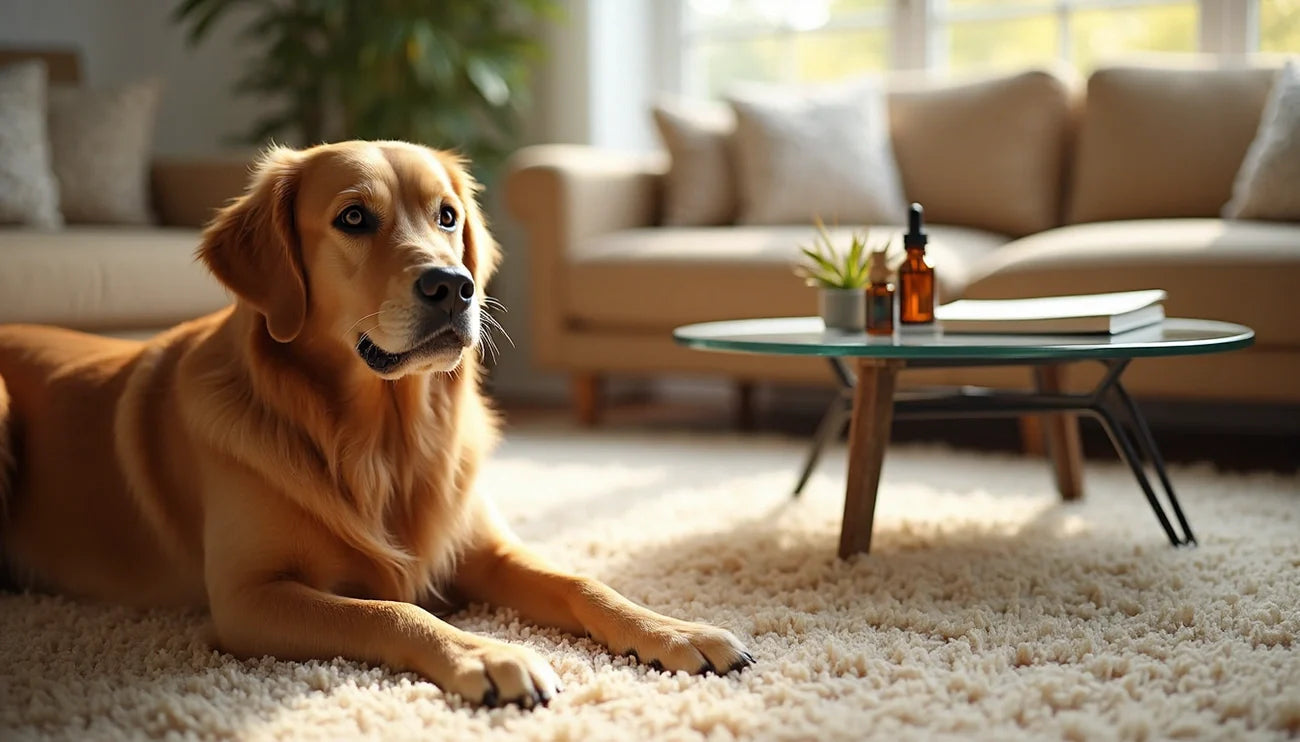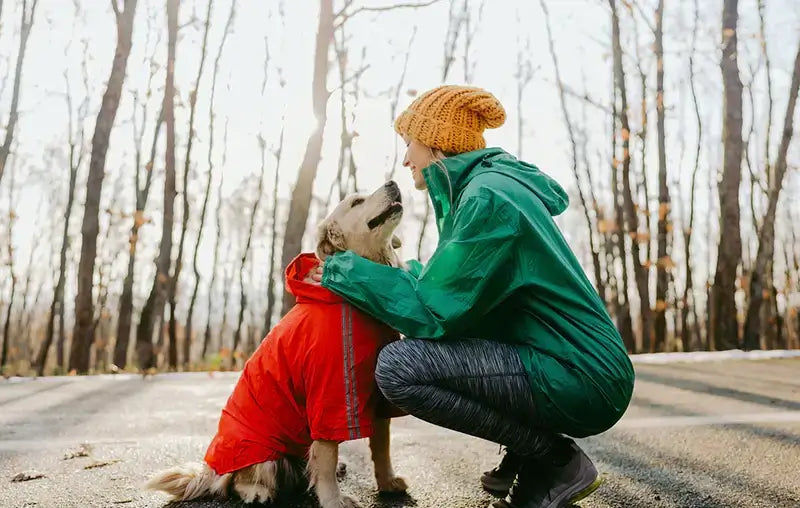
Some of our pups are more like energizer bunnies. That means they want to spend their evening hours playing with toys, barking at outside noises and getting every bit of attention they can from their best friend — you.
However, if that behavior continues into the late-night hours, it can disrupt a good night’s sleep for both you and your dog. To that end, we’ve rounded up a few tips and tricks, along with alternatives like dog cbd for how to make a dog go to sleep, so both you and your canine pal can rest easy.
#1 Create a Routine
When confronted with a particularly rambunctious new puppy, the first thing you can do is create a sleeping routine. Keeping a consistent sleep schedule can help your dog recognize when it’s time for bed.
For example, you can feed your dog breakfast and dinner at the same time throughout the week, take them on a walk at a specific point in the day or alert them to bedtime with a special activity (like getting a peanut butter treat or playing fetch a few times in the backyard).
Ideally, it’s recommended that dogs get exercise twice a day for anywhere between 15 and 60 minutes each time depending on the energy level and physical fitness of your dog.
Even feeding your dog a few hours before bedtime can alert them to the fact that you’re winding down for the evening, and they’ll be expected to go to bed soon. It’ll also give them plenty of time to digest before their nighttime snooze.
Additionally, try to cut down on any exciting stimulus during the evening, such as treats or playtime. You’ll also want to take your dog outside just before bed, so they won’t be waking you up throughout the night to use the restroom.
#2 Exercise Your Pup Daily
Exercise is a vital component in every dog’s daily routine, whether they’re hard to get to bed or not.
In fact, studies have shown that regular exercise has many physical and mental benefits for your dog: In addition to keeping your dog’s weight down, exercise can relieve your pup of excess energy, promote their good moods and cultivate a healthier relationship between the two of you.
Ideally, it’s recommended that dogs get exercise twice a day for anywhere between 15 and 60 minutes each time depending on the energy level and physical fitness of your dog.
But, sending your dog out alone to chase squirrels or sniff flowers in your backyard isn’t enough — dogs need continuous aerobic exercise. Ultimately, the amount of exercise your dog needs greatly depends on your dog’s age, breed and health:
- Active breeds – Breeds such as retrievers, border collies and Australian shepherds generally need more exercise and stimulation throughout the day. Typically, they’ll need 30 to 60 minutes of hard aerobic exercise daily.
- Small breeds – Small breeds like pugs are generally more prone to obesity. As such, they’ll need a significant amount of weekly exercise to keep their weights in check.
- Young puppies – Make sure your young puppy gets at least three exercise sessions a day. However, over-exercising your young puppy can lead to bone or joint problems, especially if the activity is strenuous.
- Older dogs – Although older dogs tend to have more joint problems than their younger counterparts, it’s still recommended that they get out and exercise every day. While an older dog can still go on walks, they may need to be a bit shorter than the ones they enjoyed in their youth.
In addition to physical exercise, dogs also need mental exercise to stimulate and challenge their minds, which includes:
- Hiking or walking through a new area
- Learning new tricks
- Playing hide and seek
- Solving a dog board game or puzzle challenge
#3 Make Your Pup’s Sleeping Space Calm
The biggest deterrents to your dog’s sleep are distractions. Toys, treats and unusual sights or sounds may wake your peaceful pup from their slumber, or prevent them from falling asleep altogether.
As such, it’s essential to create a distraction-free (and cozy) sleeping space for your dog by:
- Shutting curtains or blinds to outside distractions and light
- Using a white noise machine
- Padding their dog bed or crate with extra blankets or pillows
You can also use calming scents, such as lavender or chamomile essential oils to help your dog relax.
#4 Give Your Pup a Relaxing Massage
An easy way to calm your dog before bed is to give them a10 to 30-minute massage before bedtime. A massage may be particularly beneficial to older dogs that have muscle tenderness that may be keeping them up at night. It’s also a great way to relax a young, active or nervous dog too:
- To begin, have your dog lay down in its bed. If they’re not too keen, lure them with a treat or a few of their favorite toys.
- Once they’re settled in, move your pup onto his or her side and slowly rub their tummy back and forth. Be sure not to apply too much pressure.
- Then, move up to their head. Massage their ears and jaw in circular motions.
- Move down their neck, continuing the circular motions.
- For an extra sense of relaxation, massage their legs, paw pads and between their toes.
- Move back toward the tummy for a relaxing trip into dreamland.
When massaging your dog, be aware of any tender spots and do your best to work out any tension. However, a deep tissue massage may cause your dog discomfort, so be extra cautious of any aches your dog may be exhibiting and don’t continue if they look uncomfortable.
#5 Check For Underlying Medical Conditions
If you’ve tried all of the above and your dog is still isn’t sleeping, it may be an underlying medical condition such as:
- Injury
- Fleas
- Stress
If your dog is experiencing a loss of appetite or a behavior change — as in, they used to sleep soundly but are now up throughout most nights of the week — you should check in with your veterinarian to identify any underlying causes that may be affecting your pup’s sleep schedule.
#6 Incorporate CBD Oil
Unlike marijuana, CBD oil is a non-psychoactive compound derived from the hemp plant that can regulate your pup’s body systems — including those that control rest and relaxation.
More specifically, CBD works with your dog’s endocannabinoid system — a vast network of receptors found in all mammal species, as well as birds, insects, fish and even sea urchins.
Essentially, these receptors populate your dog’s central and peripheral nervous systems, as well as the cardiovascular, immune, gastrointestinal and reproductive tissues.
The brain, which is part of the central nervous system, works to maintain your dog’s homeostasis, including their circadian rhythm, or the natural internal process that regulates the sleep-wake cycle inside your dog’s body.
When CBD binds to the receptors of the endocannabinoid system, it may promote better sleep for your pup. Specifically, there is dog CBD oil, CBD chews and CBD rubs that can help relax your dog and ease joint stiffness due to normal daily exercise and activity for a better night’s sleep.
Reasons For Restlessness
If your dog tends to get up throughout the night, pant excessively or pace back and forth, they may be restless. The restlessness of your pup may be due to a variety of reasons, but there are typically four root causes that may be affecting your dog’s sleep:
- Stress – Stress can often prevent dogs from falling asleep. If your dog is constantly getting up, repositioning or wandering your house late at night, this could be an indicator that your dog is experiencing high levels of stress. Canine stress usually stems from a big change, such as moving houses, a loss of a family member or health issues.
- Lack of physical activity – As previously addressed, dogs need enough aerobic activity throughout the day in order to feel content, tired and ready for bed. If your dog has built up energy or is energetic by nature, it may prevent them from falling asleep at the appropriate time. As such, you should walk your dog daily, not just to help them fall asleep but to keep them healthy and strong.
- Age – Oftentimes, older dogs change their sleeping patterns as they age, taking more naps throughout the day. This may result in them feeling restless at night. Make sure their sleeping environment is as comfortable as possible to ensure they get a good rest. Joint discomfort may also prevent older dogs from sleeping throughout the night. Some older dogs also experience “doggy dementia” in which they become confused about their surroundings, which may also lead to restlessness throughout the night. On the other hand, some puppies may not be able to sleep through the night due to high energy levels or a need for potty breaks.
- Aches – Going hand in hand with older age, your geriatric pup may be experiencing aches due to joint issues. Dogs that have recently undergone surgery or experienced an injury may also have trouble falling asleep.
- Diet – Feeding your dog higher quality foods can help with restlessness. Some types of kibble can cause changes in blood pressure due to high levels of carbohydrates and sugar. As such, it’s best to feed your pup all-natural foods at least three hours before bedtime to prevent any spikes in energy. Additionally, you should always take your dog outside to relieve themselves before bed so they aren’t waking you up in the middle of the night.
Help Your Dog Sleep Soundly With Zebra CBD
When asking yourself “how to make my dog go to sleep,” it’s important to first identify what may be the root cause of their sleeplessness.
With Zebra CBD, you can help your pup sleep soundly for nights to come with our premium canine CBD products made with organically grown, third-party-tested hemp extract.
Consider promoting healthy sleep with CBD oil for dogs or our CBD Stress & Calming Chews. We also offer CBD Joint & Hip Chews and CBD Balm for dogs dealing with joint discomfort, injuries or irritated skin that may be preventing them from falling asleep.
No matter your dog’s sleep time woes, we’re here to help any dog parent and their pup achieve a good night’s sleep. Check out Zebra CBD today for more information on natural calming remedies for dogs.
Source:
American Kennel Club. Puppies: How Much Exercise is Too Much? https://www.akc.org/expert-advice/health/puppies-how-much-exercise/










